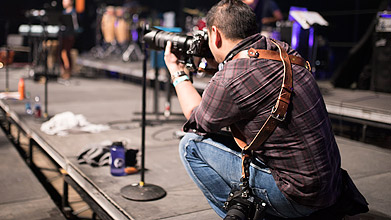Micah Albert knows a thing or two about discomfort. In his photojournalism career, Micah has collected nearly as many stories of peril as he has awards for his work—which is to say, quite a few. The one about being kicked out of Yemen during the Arab Spring, for example. Or dodging Molotov cocktails during a riot in Kenya. Or the one about the brain parasite he survived in the Congo. The list goes on.
On paper and in person, Micah fits the photojournalist mold: athletic, denim shirt untucked, a salt-and-pepper beard covering a much younger-looking face. He has a slow-burn intensity, mixed with self-effacing charm, that radiates curiosity and thoughtfulness—a storyteller’s heart in an explorer’s body. By his own admission, he’s a bit rough around the edges.
Micah collected a graphic communications degree from Point Loma Nazarene University with every intention of pursuing a comfortable career in advertising. “I landed a really great job with a parking spot and nice office—all those things that, as a 24-year-old, you’re supposed to want. And I went, ‘Okay, is this it for the next 35 years?’ I wasn’t okay with it. So I quit. Cold turkey.”
With his wife’s blessing, Micah took the uncomfortable path instead, and pursued a career as a photojournalist. He hustled to find work starting out, with success trickling in little by little. “I had no support. I was just jumping on airplanes, looking for stories, just gumption mixed with a little naiveté,” he says.
During a routine trip with his wife to North Africa, Micah found a part of the world that captured his imagination. Dissatisfied with walking the same well-worn path as other tourists, Micah felt his explorer’s instinct kick in. “We just kept asking ourselves, ‘How do we get away from this? How do we get to places that are less well-trod?’”
He discovered a region knotted by religious conflict and cultural rifts, one whose issues the Western media rarely covered. “Causality is interesting. When one thing affects another region, I’m fascinated by that. When AK-47s that were used by Iraqis end up in the Congo three years later, that’s interesting,” says Micah. “North Africa is just dripping with complicated things that need to be better understood.”
Since then, Micah has come to specialize in covering North African and Middle Eastern stories for Western media, shooting projects in places like Kenya, Algeria, and Syria. His work has appeared in—among other publications—National Geographic, Rolling Stone, the New York Times, and the Washington Post.
Micah has come to specialize in covering North African and Middle Eastern stories for Western media, shooting projects in places like Kenya, Algeria, and Syria. His work has appeared in—among other publications—National Geographic, Rolling Stone, the New York Times, and the Washington Post.
Micah’s work has taken him into places that are uncomfortable, both physically and spiritually. He has pointed a camera directly at the pain and brokenness in the world.
Despite his growing platform as a public speaker, Micah remains ambivalent about it. But the things that he’s seen compel him to step out from behind a lens and stand in front of an audience. “I see our time is so brief,” he says, “and there’s so much to do here as believers. There’s so much—to me—urgency, more now than ever. I feel like I need to be speaking for younger people to hear some of these stories.”
For Micah, what he has to tell students isn’t a message that’s always heard from a pulpit or in Christian culture—it’s a message of embracing discomfort.
“A lot of what I’ve been seeing and hearing in church in the last few years has just been a little soft for my taste,” says Micah. “There’s nothing in the Bible that talks about safety, at least the way I read it. You follow Jesus, and things don’t always go well. Expect things to be difficult.”
“As followers of Christ, we are called to be in a constant state of tension. As soon as that tension is gone, it equals a complacency. I’m not seeing the encouragement of young people into more pressure, more tension. Just soft. When you’re young, that’s the time to floor it.”
Micah’s experiences have placed him firmly in the uncomfortable place of asking difficult questions, ones he ultimately wants to call students to explore.
“The older I get, the more I see and experience the capacity of God’s love. I don’t know how it can coexist with also knowing how much hurt and pain and evil there is happening, right now [at this moment]. How can that coexist? I don’t know. But that’s maybe why I’m here, to get people to make some hard decisions.”
Listen to Micah’s seminar: Challenging Comfortable: Storytelling through Photojournalism

